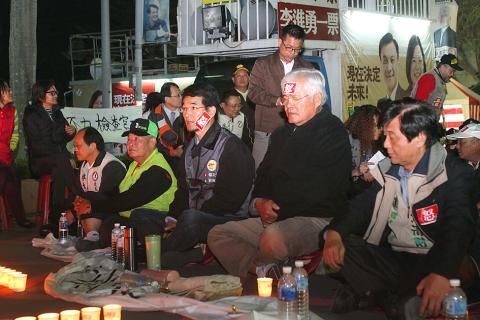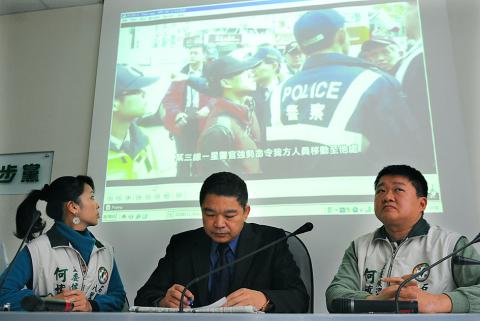The fairness of Saturday’s presidential and legislative elections is in question after nationwide reports of the improper handling of cases of suspected vote-buying by the police and judiciary, the Democratic Progressive Party (DPP) said yesterday.
Lee Chin-yung (李進勇), the DPP legislative candidate in Yunlin County’s first district, and Liu Chien-kuo (劉建國), the DPP legislative candidate in Yunlin’s second district, had been on a hunger strike since -Tuesday night in front of the Yunlin District Prosecutors’ Office to protest a raid on Lee’s campaign headquarters in Tuku Township (土庫) earlier that day, which the two claimed was an act of political repression.
Chiang Teh-lung (蔣得龍), chief of the Yunlin District Prosecutors’ Office, said his office had received reports that alleged Chen Wei-teh (陳威德), one of Lee’s campaigners, was involved in election betting prior to raid, adding that the investigation was legal even though the office found no evidence of wrongdoing and did not confiscate any documents.

Photo: Lin Kuo-hsien, Taipei Times
Lee and Liu, who decided to suspend their campaign activities, ended the hunger strike yesterday afternoon after a visit by DPP vice presidential candidate Su Jia-chyuan (蘇嘉全), who urged the two to carry on campaigning.
Yunlin County Commissioner Su Chi-fen (蘇治芬) voiced support for her party comrades, saying that the judiciary was turning a blind eye to prevalent vote-buying in the pan-blue camp to carry out selective enforcement against DPP politicians.
In Chiayi County, another hunger strike ended yesterday as Tsai Chi-fang (蔡啟芳), a former DPP legislator and father of a DPP legislative candidate in the county’s first district, Tsai Yi-yu (蔡易餘), was sent to a hospital at 11am for dehydration and dizziness.

Photo: Lin Kuo-hsien, Taipei Times
Tsai Chi-fang said the local judiciary and police were ignoring vote-buying allegations against the pan-blue camp and he began his hunger strike on Jan. 4 in front of the Chiayi District Prosecutors’ Office.
DPP spokesperson Kang Yu-cheng (康裕成) told a press conference in Taipei that the judiciary’s inaction in the face of widespread vote-buying allegations against the pan-blue camp was unjust.
DPP mayors and commissioners in six cities and counties — Greater Kaohsiung and Greater Tainan, as well as Chiayi, Yunlin, Pingtung and Yilan counties — have issued a joint statement urging fair and stringent investigations into vote-buying, Kang said.
Vote-buying in Greater Taichung, Changhua and Nantou counties has caused great concern, she added.
Commenting on the Yunlin case, DPP lawyer Lin Hung-wen (林鴻文) said the raid was highly questionable and appeared to be unnecessary because the prosecutors did not gather evidence.
Meanwhile, Ho Po-wen (何博文), the DPP legislative candidate for New Taipei City’s (新北市) first district, yesterday said local police used violence against his wife while she was campaigning at a local market in Linkou District (林口) on Tuesday morning.
Chiu Chin-an (邱槿桉), Ho’s wife, said police punched and pushed her, as well as her staffers, because they were campaigning in the same place as President Ma Ying-jeou (馬英九), who is seeking a second term.
In response, Tsai Yao-kun (蔡耀坤), director of the New Taipei City Police Department’s Sinjhuang Precinct, said members of Ho’s campaign were asked to keep a distance from the designated point of arrival of the presidential motorcade, which is standard procedure, adding that officers did not use violence.

The Ministry of the Interior (MOI) is to tighten rules for candidates running for public office, requiring them to declare that they do not hold a Chinese household registration or passport, and that they possess no other foreign citizenship. The requirement was set out in a draft amendment to the Enforcement Rules of the Public Officials Election and Recall Act (公職人員選舉罷免法 ) released by the ministry on Thursday. Under the proposal, candidates would need to make the declaration when submitting their registration forms, which would be published in the official election bulletin. The move follows the removal of several elected officials who were

The Republic of China (ROC) is celebrating its 114th Double Ten National Day today, featuring military parades and a variety of performances and speeches in front of the Presidential Office in Taipei. The Taiwan Taiko Association opened the celebrations with a 100-drummer performance, including young percussionists. As per tradition, an air force Mirage 2000 fighter jet flew over the Presidential Office as a part of the performance. The Honor Guards of the ROC and its marching band also heralded in a military parade. Students from Taichung's Shin Min High School then followed with a colorful performance using floral imagery to represent Taiwan's alternate name

FOUR DESIGNATED AREAS: Notices were issued for live-fire exercises in waters south and northwest of Penghu, northeast of Keelung and west of Kaohsiung, they said The military is planning three major annual exercises across the army, navy and air force this month, with the navy’s “Hai Chiang” (海強, “Sea Strong”) drills running from today through Thursday, the Ministry of National Defense said yesterday. The Hai Chiang exercise, which is to take place in waters surrounding Taiwan, would feature P-3C Orion maritime patrol aircraft and S-70C anti-submarine helicopters, the ministry said, adding that the drills aim to bolster the nation’s offshore defensive capabilities. China has intensified military and psychological pressure against Taiwan, repeatedly sending warplanes and vessels into areas near the nation’s air defense identification zone and across

A Chinese takeover of Taiwan would severely threaten the national security of the US, Japan, the Philippines and other nations, while global economic losses could reach US$10 trillion, National Security Council Deputy Secretary-General Lin Fei-fan (林飛帆) wrote in an article published yesterday in Foreign Affairs. “The future of Taiwan is not merely a regional concern; it is a test of whether the international order can withstand the pressure of authoritarian expansionism,” Lin wrote in the article titled “Taiwan’s Plan for Peace Through Strength — How Investments in Resilience Can Deter Beijing.” Chinese President Xi Jinping’s (習近平) intent to take Taiwan by force